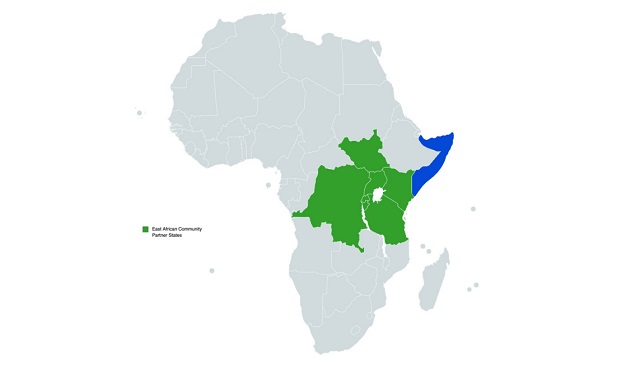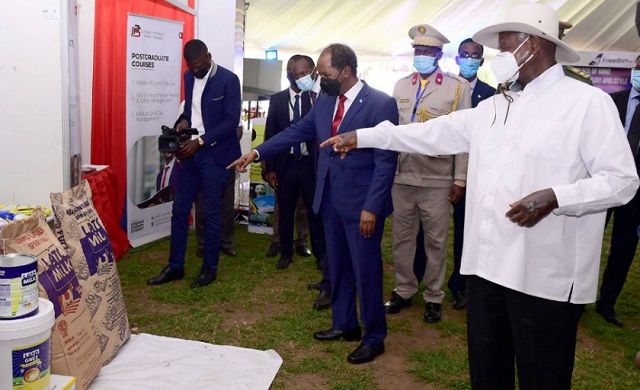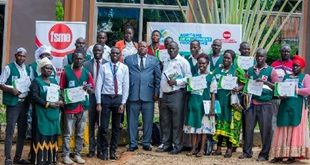
Analysts welcome move but fear bloc is expanding too fast
Kampala, Uganda | RONALD MUSOKE | Just eleven days after the Democratic Republic of Congo ratified the East African Community Treaty on July 11, the bloc’s leaders agreed to fast-track the verification of Somalia’s application to join the community.
Sitting on July 22 in Arusha, Tanzania, where the East African Community Secretariat is based, the East African Community Heads of State Summit agreed to fast-track the verification of Somalia’s application which it first sent in 2012.
The Summit directed the Council of Ministers to expeditiously carry out the verification exercise in accordance with the EAC procedure for admission of new members into the EAC and report to the 23rd meeting of the Summit.
This followed Somalia’s President, Hassan Sheikh Mohamud, formally requesting the Summit consider his country’s application to be the eighth partner state of the East African Community. In his address of the High-Level Retreat of the EAC Common Market protocol, President Muhamud who became Somalia’s president for the second time in May this year, enumerated reasons why Somalia should join the regional bloc.
The Summit first directed the Council of Ministers to initiate a verification exercise for Somalia’s admission last year. This is a key requirement for determining the eligibility of a potential member. That push gained new agency at this year’s High-Level Retreat on the EAC Common Market Protocol and Heads of State Summit as the DR Congo took its seat as the newest member of the EAC.
Somalia’s first application made in 2012 was met with lack of enthusiasm from some member countries, thanks to its internal political problems. But, in 2019, then Somali President, Mohamed Farmajo, reapplied alongside the Democratic Republic of Congo. Interestingly, in February, last year, the bloc decided to admit DR Congo ahead of Somalia.
New Somali president, Mohamud, said he understands where Somalia is coming from. He, however, noted that Somalia now feels ready to play its part, using its pool of industrious entrepreneurs. He also pointed to the country’s expansive 3,000km long coastline along the Indian Ocean which he said can be used to boost the regional economies.
“We don’t want to be a liability anymore. We want to be a contributing partner to this great community of nations. It will be a dream come true on the day that Somalia will access this great community,” he said.
“Somalia belongs to East Africa; there is no country among the seven countries sitting here that Somalia is not linked to by business, by community or by any other means,” President Muhamud added.

Anisa Osman Dirie, a senior administrator at the African Union told Turkish news agency Anadolu recently that although the collapse of the political system in Somalia has stunned the world, it does not mean that viable patriotic visionary leaders do not exist.
“It is therefore necessary that whoever wishes for Somalia to go out of the present instability support its access to EAC membership and leadership, as well as other intergovernmental organisations like IGAD, the UN, and the African Union or different commissions, (as) this would set the agenda for Somalia’s state building struggle.”
Should Somalia get admitted, it will become the fifth largest state in the bloc at 637,660 sq km, just behind South Sudan, Kenya, Tanzania and the DR Congo. However, with its population of 16 million and an economy valued at about US$7.29 billion by the World Bank, it remains to be seen what Somalia will bring to the table.
However, Fred Muhumuza, an economist based at Makerere University told The Independent on Sept.02 that he thinks prospective countries such as Somalia should be allowed to join the East African Community.
“They are part of us; there is no new language or culture involved and they have been trading with us for a long time,” Muhumuza told The Independent.
Under the EAC Treaty, the criteria for the admission of new countries into the community include acceptance of the community as set out in the Treaty, adherence to universally acceptable principles of good governance, democracy, the rule of law, and the observance of human rights and social justice.
Other criteria include the potential contribution to the strengthening of integration within the East African region, geographical proximity to and inter-dependence between it (the foreign country) and the EAC partner states, the establishment and maintenance of a market-driven economy, and social and economic policies being compatible with those of the community.
Somalia ticks off several boxes of these criteria. It borders Kenya, one of the members of the East African Community to the northeast. Even without being a full member of the East African Community, Somali citizens have shown their business acumen in the region and run some vibrant businesses in Kenya, South Sudan, Tanzania and Uganda. Owing to many decades of political turmoil in Somalia, tens of thousands of its citizens have also found a more peaceful home within the East African Community. But, many live in East Africa as refugees.
Should the country become a full member of the East African Community, Somali citizens will now have freedom to move and do business across the bloc, and the country would benefit from the economic, political and social support programmes of the community. Under the 1999 EAC Treaty, if Somalia joins the bloc, the country would have visa-free entry to the EAC countries and be eligible for East African passports, as well as the tax-free access to the EAC market.

President Yoweri Museveni has been quick to throw his weight behind Somalia’s recent bid, saying “Somalia has all qualifications to join the East African Community.”
These credentials, President Museveni says, include sharing a border with one of the member countries, having a private sector-led economy and ‘being a democratic country.’ Museveni was speaking during the closing ceremony of the inaugural Uganda-Somalia Business and Investment Summit which President Muhamud attended during his State Visit to Kampala in August.
The summit held August 9-10 at Speke Resort Munyonyo in Kampala was aimed at providing a platform for both the Ugandan and Somali private sector/business community together with other relevant stakeholders like Government ministries, Departments and Agencies, to freely exchange views and ideas.
But, despite both the geographical and historical ties, not everyone is convinced about Somalia’s bid. Some regional analysts are not only unconvinced about Somalia, they already had reservations about the other newer members of the community: the Democratic Republic of Congo, South Sudan and Burundi. They say ever since the new members joined, they have added little value to the community.
They say the East African Community is not yet mature for further expansion because it is already not working optimally for its members despite commitments on paper. Free trade, for instance, is yet to happen as stipulated in the protocols. In instances where it occurs, it only happens when it is convenient to one member. Some say South Sudan which became a full member of the EAC in September, 2016, is yet to add value and it remains to be seen how the partners will negotiate the DR Congo’s complex security and political baggage.
But Godber Tumushabe, a policy analyst and Associate Director of the Great Lakes Institute for Strategic Studies (GLISS), a Kampala-based policy think tank, told The Independent that it is not true that the new members joining the East African Community are bringing baggage to the bloc. Tumushabe said the countries in the eastern African region (including Ethiopia) are at the same level geo-politically.
“They are the same; many of the members that are already within the EAC have weak socio-economic structures and are also fragmented politically.” So, from a geo-political argument, it is good for the likes of DR Congo and Somalia to join the East African Community,” Tumushabe said.
Sabiti Makara, a lecturer of political science at Makerere University also told The Independent on Sept.02 that he supports the vision of presidents like Yoweri Museveni who believe that Africa should look for solutions for African challenges. “This (new members joining the EAC) is a blessing rather than anything else,” Makara told The Independent.
“As Africans we face the same challenges; underdevelopment, a weak industrial base, failure to trade more amongst ourselves and the continued dependence on foreign help from the likes of China, the U.S and Europe.”
“So we need to stop being short-sighted by continuously looking at our superficial borders. If there are challenges in Somalia or DR Congo, these should be challenges of the rest of Africa and not Somalia or Congo.”
“Kenya has a strong industrial base and that helps countries like Uganda, Burundi, Rwanda and DR Congo to easily get these goods.” Makara thinks the common East African currency will even be better for these countries once it is adopted. According to the East African Community Secretariat, a single currency for the bloc has been scheduled for 2024.
But Tumushabe quickly adds that at the moment the bloc cannot grow stronger because the regional leaders choose to squabble over small issues rather than focusing on the bigger picture which is to grow the institutions of the bloc.
Tumushabe says the bloc’s next generation of leaders should have a more robust proclivity towards strengthening the bloc’s institutions because the institutional structural set-up within the East African Community is still struggling to work.
“DR Congo accuses Rwanda or Uganda of supporting rebel outfits like M23. Kenya and Uganda continue to squabble over trade in certain products while Rwanda/Uganda and Rwanda/Burundi choose to close borders for prolonged periods of time. Where exactly do they go to resolve their conflicts?”“Let’s grow but there is still so many holes that need to be plugged,” Muhumuza told The Independent.
****
 The Independent Uganda: You get the Truth we Pay the Price
The Independent Uganda: You get the Truth we Pay the Price



Best east africa loading.. Welcome somalia to peace and freedom stuation.